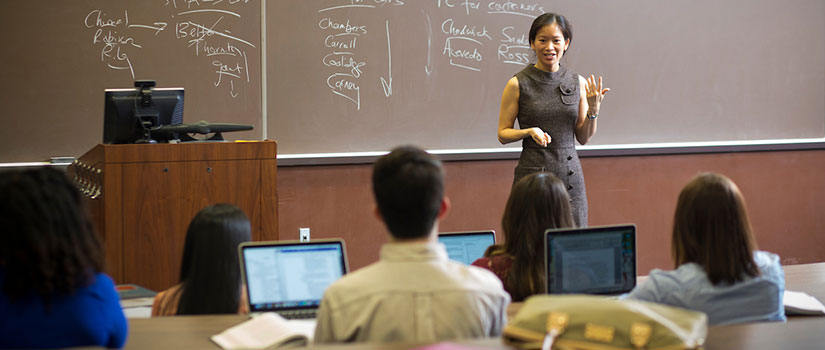The Preamble to the Model Rules of Professional Conduct specifically identifies lawyers as public citizens. In an increasingly complex world, lawyers must stand in the intersection of law, industry, and community. We are called to lead – with intentionality – to resolve conflict, to preserve the rule of law, and to advance the common good.
The University of South Carolina Joseph F. Rice School of Law prepares lawyer leaders to serve their profession and their communities through rigorous legal studies, exceptional experiential training, and comprehensive professional identity formation.
We offer a wide range of relevant courses. Not every course is offered regularly, and to be a well-rounded lawyer you should take many other courses as well.
Lawyers as Leaders
Lawyers as Leaders (LAWS 856) is the law school’s signature leadership course. Students in the course participate in self-assessment, learn and read about effective leadership, engage in discussion with respected leaders, participate in exercises designed to develop strong judgment and analytical reasoning skills, and complete a project that demonstrates the leadership principles they learn.
An integral component of the course is student ownership of parts of the curriculum. Students are responsible for researching and leading the class discussion on leadership principles throughout the course. In doing so, students deepen their substantive knowledge of key leadership skills, while also developing public speaking and presentation skills. The topics assigned throughout the course include:
- Leadership of self
- Setting goals
- Resilience and growth mindset
- Giving and receiving feedback
- Integrity and character
- Wellness
- Leadership of others
- Understanding group dynamics
- Relationships and influence
- Inclusive excellence
- Communication styles
- Leadership in community
- Understanding organizational structures
- Legacy and impact
- Lifelong learning
- Reflection
Other courses
Other law school courses teach skills and perspectives that are especially important to effective and ethical leadership. The following list includes a representative sampling of some of the courses in our curriculum in which students may find components of leadership training.
- Alternative Dispute Resolution
- Business Associations
- Capstone Course: Small Business Organization
- Disability Law in the Workplace
- Drafting Business Agreements
- Employment Discrimination
- Financing the Start-Up Business and Venture Capital Financing
- Free Speech and Democratic Theory Seminar
- Interviewing, Counseling and Negotiation
- Land Use Planning
- Law and Economics
- Law and Political Economy
- Legislation
- Legislative Process
- Media Law
- Mergers and Acquisitions
- Nonprofit Organizations
- Project Finance
- Public Interest Law Externship
- Social Impact of Business Activity
- Technology Law: Law of the Newly Possible
- The Future of the Legal Profession
- Transportation Law
The USC Rice School of Law offers a number of combination degree programs, which allow students to complete a Juris Doctor and a graduate degree in another program. Combination degree programs that feature leadership components include Accountancy, Business Administration, Economics, Human Resources, International Business Administration, Journalism and Mass Communications, and Public Administration.
The USC Rice School of Law is home to a number of programs and other initiatives that focus on leadership training and public service.
- The Konduros Leadership Development Program features the law school’s signature leadership course, Lawyers as Leaders. The law school plans to grow the Program through collaborations with other university and community partners and by expanding the law school curriculum to include more leadership-focused courses.
- The Nelson Mullins Riley & Scarborough Center on Professionalism promotes civic leadership and public service in the practice of law.
- The law school’s PILLARS program is our signature Professional Identity Formation Initiative. The Program is centered
on helping students develop skills related to the following core competencies:
- Innovation and Problem Solving
- Resilience, Wellness & Growth Mindset
- Financial and Business Acumen
- Leadership and Service
- Communication and Cultural Citizenry
- The law school’s nationally recognized Pro Bono Program engages students in public service while enabling them to gain valuable professional skills.
- The law school’s Bridge to Law Program provides the opportunity for law students to mentor middle and high school students interested in law. Mentors develop leadership and facilitation skills.
All our student organizations and law journals offer valuable leadership opportunities, including:
- Student Bar Association (the law school’s student government)
- Honor Council (which promotes academic responsibility)
- Phi Delta Phi (which promotes ethics and philanthropy in law)
- James L. Petigru Public Interest Law Society
These (and other) faculty and staff may be available to advise you, supervise your own legal research ("SLR"), or hire you as a research assistant. Learn about them through their biographies, and then consider reaching out.
- Professor Jan Baker, Director of the Konduros Leadership Development Program and Professor for Lawyers as Leaders
- Professor Elizabeth Chambliss, Director of the Nelson Mullins Riley & Scarborough Center on Professionalism
- Elizabeth Crane, Director of Career and Professional Development and the PILLARS Program
- Bryant Park, Senior Associate Director of Career and Professional Development
- Dean William Hubbard, Professor for Lawyers as Leaders (LAWS 856)
